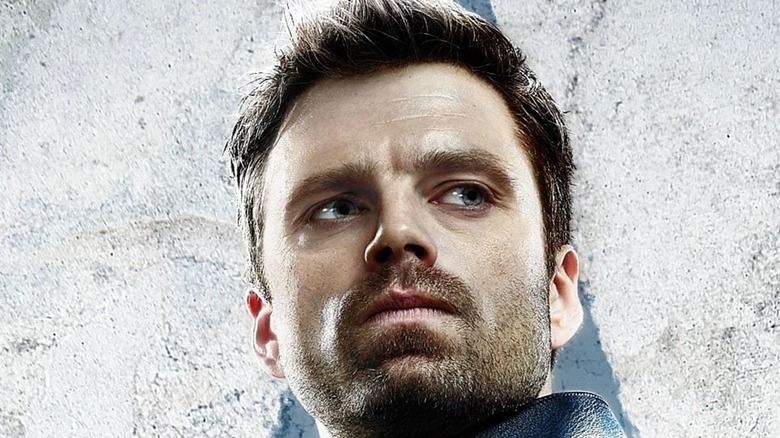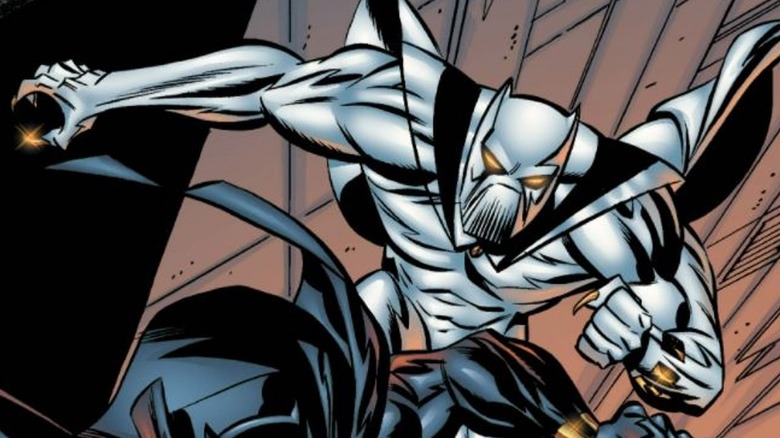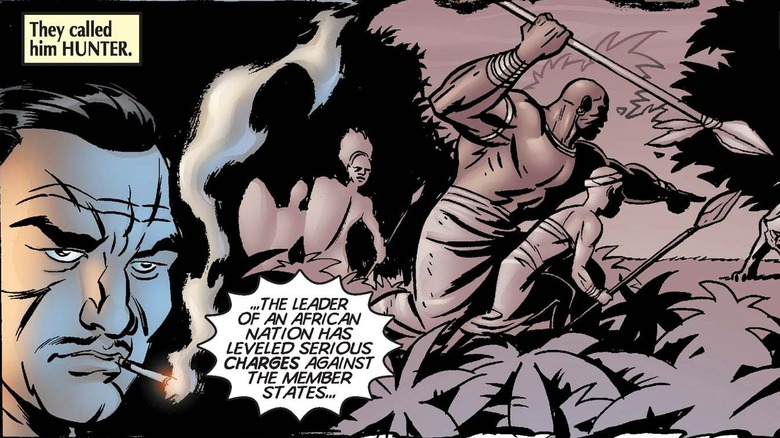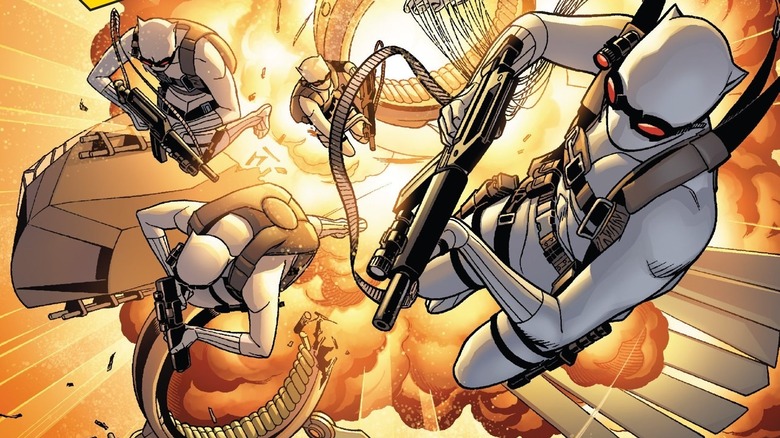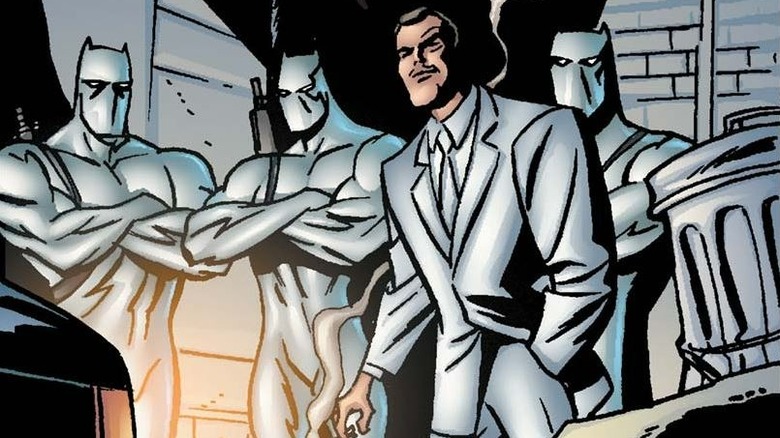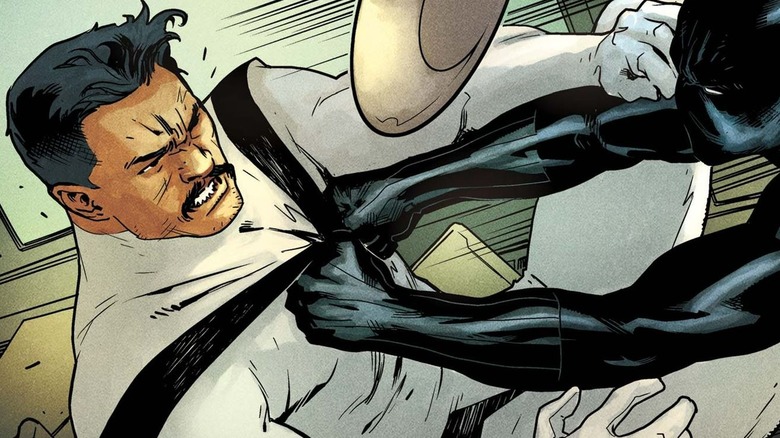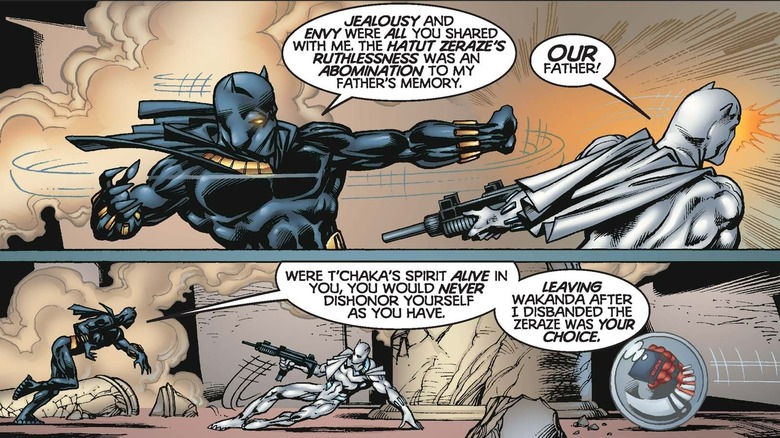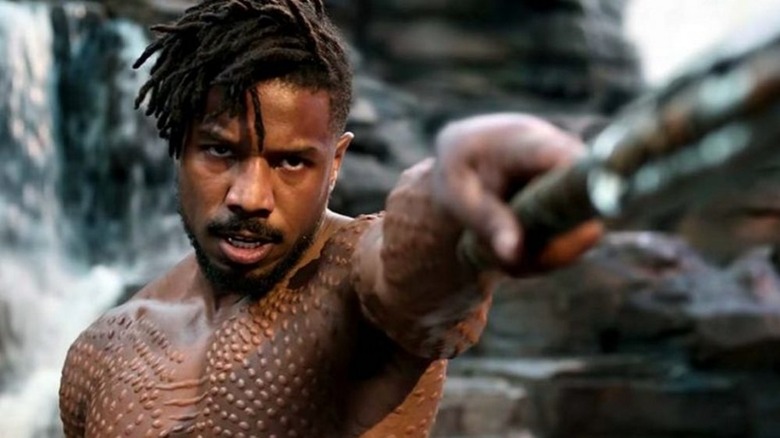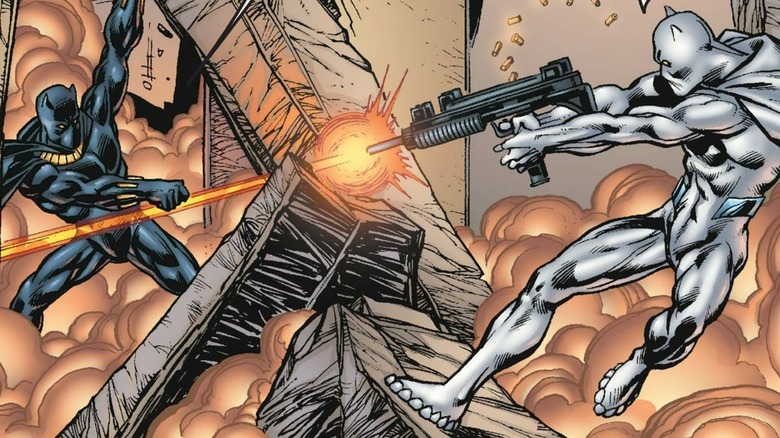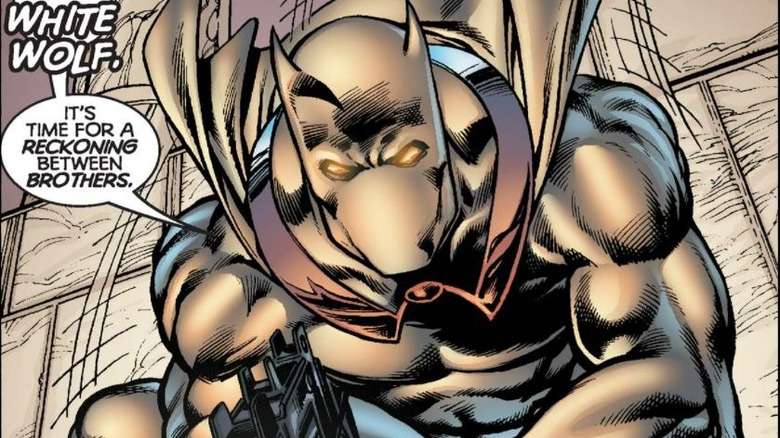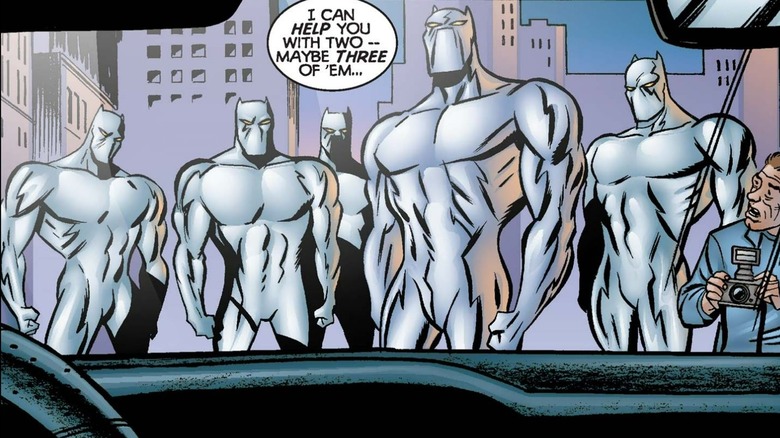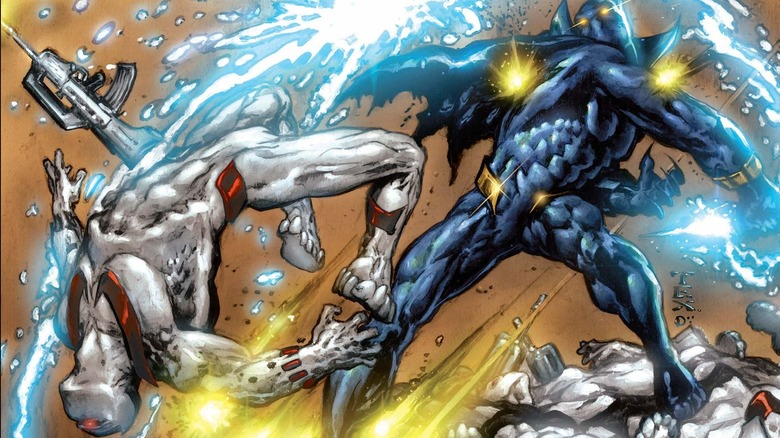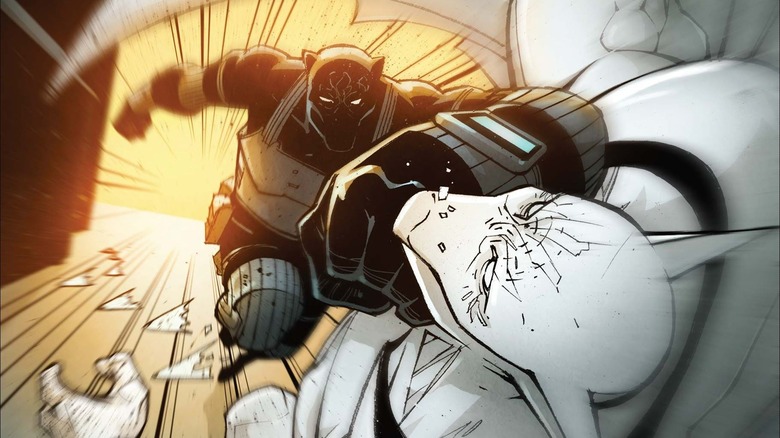How The White Wolf In The MCU Differs From The Comics
During the first decade of the Marvel Cinematic Universe, James Buchanan Barnes became many things. He started out simply as "Bucky," the childhood friend and comrade-in-arms of Steve Rogers, but when he seemingly died after falling from a train high in the mountains, HYDRA remade him into the terrifying Winter Soldier. He became a specter of death the world over until, reunited with Captain America at long last, then finally regained his sense of identity.
Broken both physically and mentally, Steve and T'Challa (aka the Black Panther) brought Bucky to Wakanda so that he might finally begin to heal and find peace. The Wakandans tended to his wounds, gave him a new cybernetic arm, and helped him free his mind from HYDRA brainwashing. Barnes became a friend of Wakanda, and with that friendship, he also received a new name: the White Wolf.
The thing is, this isn't a new name in the world of Marvel Comics, but what makes its use so interesting is the fact that its comic book counterpart has nothing to do with Bucky Barnes. So, how does the White Wolf in the MCU differ from the comics? The answer is, in just about every way possible.
He is a completely different character
To start off, the comic book version of the White Wolf is not James Buchanan Barnes. Instead, it is a man simply named "Hunter." Hunter and Bucky aren't long-lost relatives or life-long enemies. In fact, they've never even actually met. Instead, Hunter is the adoptive brother of King T'Challa.
He uses a white, slightly more canine version of the classic vibranium Black Panther costume, so he and the MCU's Bucky Barnes do share some very surface-level similarities due to their connections to Wakanda. Both use vibranium as a part of their respective arsenals, and both of them received the name "White Wolf" from their versions of Wakanda, but the similarities end there.
Created in 1998 by writer Christopher Priest and artist Mark Texeira, Hunter was first introduced in "Black Panther" #4 as an old ally of T'Challa's that had been pushed away because of his extreme methods. Hunter didn't fight in World War II or join the Avengers. Instead, he's a minor villain of the Black Panther who has never even met Captain America, let alone fought as well.
He was raised in Wakanda
1999's "Black Panther" #10 shows the origins of the character, twelve years before T'Challa was born, during the reign of his father, T'Chaka.
The comic depicts a small, inconspicuous plane crashing in the outskirts of the African Kingdom of Wakanda. Hunter's parents both die in the crash, leaving him the sole survivor.
The married Wakandan couple who find him can't decide what to do, so they bring the infant to the king, asking him to decide the boy's fate. Though both Wakandans and readers still know nothing about his parents' history or heritage, King T'Chaka decides to adopt the boy and raise him as his own son.
Though the boy comes to be loved sincerely by his royal parents, many Wakandans keep Hunter at arm's length due to his pale skin. Wakanda is still hiding itself from the world at this time, and is intensely xenophobic. Fearing and distrusting all outsiders, Hunter's appearance ensures all Wakandans that they will always be reminded of his origins.
He's the leader of Wakanda's secret police
Because Hunter knew that his fellow Wakandans would always struggle to accept him, he strove to become the perfect Wakandan. He learned their history inside and out, trained his body to physical perfection, and devoted himself to their religion.
Hunter was twelve years old when his younger brother, T'Challa, was born, and the event finally made Hunter realize that he would never be king. Despite the fact that he was T'Chaka's son in every other way, he was still not of royal birth. Hunter resented T'Challa as a result, but he strove to serve his father in other ways and, as told in 1999's "Black Panther" #9, eventually became the leader of the "Hatut Zeraze," Wakanda's Secret Police.
A true patriot of Wakanda, Hunter's deep and genuine love for his adopted homeland made him a perfect choice for the position. The clandestine group's Wakandan name translates roughly to "The Dogs of War." Under Hunter's command, they were responsible for resolving both external and internal disputes by any means necessary.
His codename is an actual title
Though Bucky Barnes received the name "White Wolf" from the Wakandans as a sort of affectionate nickname, Hunter earned it as an official title the day he became the head of the Hatut Zeraze. The "White Wolf" was the official rank of the organization's leader, and he served the kings of Wakanda in this role for many years.
Under King T'Chaka, Hunter purposefully kept many of his activities hidden from his morally-upright adoptive father, anticipating that the king would not approve of what Hunter knew must be done in order to keep his home safe. He was brutal and efficient, and he didn't care who he hurt as long as he perceived it to be in the best interests of Wakanda. In 2018's "Rise of the Black Panther," after T'Chaka was killed by Klaw, Hunter served the fallen king's older brother S'Yan as the White Wolf until T'Challa was finally old enough to take up the throne for himself.
He committed atrocities on purpose
Anyone who has watched Sebastian Stan's Bucky Barnes in the Marvel Cinematic Universe movies knows that the character is not evil, but has been forced to do some horrible things. He has assassinated hundreds of people throughout the decades, including Tony Stark's parents, but only did those things because of HYDRA's all-consuming brainwashing. As soon as that was undone, his noble nature returned to the surface, and he became a hero once again.
This cannot be said for Hunter, the White Wolf found in Marvel Comics. This canine character used his intense love of his nation to justify committing horrible atrocities in the name of keeping it safe, and though he largely succeeded in doing so, it did not make those actions any less evil.
Though few exact details have been given regarding Hunter's crimes, 1999's "Black Panther" #5 shows T'Challa catching up with the man torturing vibranium smugglers. Meanwhile, "Rise of the Black Panther" #5 in 2018 shows T'Challa stopping Hunter from assassinating their unknown half-brother, all in order to eliminate a potential challenger to the throne.
He chose to leave Wakanda and blamed it on T'Challa
T'Challa never believed in the White Wolf and his Hatut Zeraze's brutal methods and eventually disbanded the group altogether. Unwilling to cease their activities, Hunter and the rest of the crew simply moved abroad and began operating largely as mercenaries, though they remained loyal to Wakanda and still undertook missions meant to aid their former homeland.
During a time of unrest in Wakanda during Christopher Priest's run in 1998 and 1999, the White Wolf revealed himself to T'Challa in "Black Panther" #4 and demanded that his king finally command the Hatut Zeraze as they were meant to be used, but after T'Challa repeatedly refused their aid, he eventually revealed that he resented the Black Panther for "exiling" he and his men from the country.
The thing is, this never happened. As T'Challa points out in "Black Panther" #12 from that same year, Hunter chose to leave Wakanda as the White Wolf after the Hatut Zeraze were officially disbanded. Nobody made him and his men leave the country — they chose to do so themselves, and could have returned at any time.
He has more in common with the MCU's Eric Killmonger than Bucky Barnes
The Marvel Cinematic Universe and Marvel Comics' versions of "The White Wolf" have so little in common, in fact, that Hunter shares more in common with the MCU's Eric Killmonger than he does with Bucky Barnes. The main antagonist of the hit 2018 film "Black Panther," Eric Killmonger is a lost son of Wakanda played by Michael B. Jordan. His father, N'Jobu, left Wakanda to work undercover in America, where he fell in love and witnessed first hand the racism and oppression that people with African heritage experienced around the world.
Not willing to watch as people suffered, N'Jobu helped Ulysses Klaw steal vibranium from Wakanda in an attempt to arm people around the world and help them violently rise up against their oppression. His brother, the Black Panther T'Chaka, killed N'Jobu for his betrayal and thus ended his scheme. What T'Chaka didn't know is that his brother had a son, N'Jadaka, who would one day challenge T'Challa for the throne and become a sort of "evil Black Panther."
Both men are estranged members of the Black Panther's family who challenge him for the throne using an incredibly similar vibranium suit before finally being defeated. Likewise, both men vehemently believed that violence, no matter how brutal, was the only way to achieve their goals and ensure Wakanda's safety. Their main difference was how many people across the globe they considered to be "Wakandan."
He has more tech at his disposal than just a metal arm
When Bucky Barnes first arrived in Wakanda, he had only his fractured mind. His old cybernetic arm was destroyed by Iron Man during their fight at the end of "Captain America: Civil War" in 2016, and he would not receive another for several years to come, in 2019's "Avengers: Infinity War."
Now known by the Wakandan people as the "White Wolf," T'Challa sent for him when his nation was targeted by Thanos' forces and gave him a new, vibranium arm. The arm was almost completely invulnerable and at least as strong as his old one, but despite its impressive nature, it doesn't really compare to the vast arsenal at the command of the Hatut Zeraze.
As the White Wolf, Hunter received his own suit of vibranium armor that was clearly modeled after the traditional Black Panther suit worn by Wakanda's kings. Hunter's armor, however, was white, with additional minor detailing that helped give it a slightly more canine appearance. It had all of the same capabilities as the Black Panther suit, with a couple exceptions: His could turn invisible and morph itself into an all-white business suit, as seen in 1999's "Black Panther" #4.
He's the Black Panther's equivalent to "Loki"
As the White Wolf, Hunter has often been compared to Marvel's Loki. Though the God of Mischief's role in the Marvel Cinematic Universe has evolved with the release of his own Disney+ television series, this comparison still largely holds true. Both men are the adoptive son of a great king, and both of them grew to resent their older sibling, believing with varying degrees of validity that their brother was the true favorite, while resenting that they would never become kings themselves.
Likewise, both Loki and Hunter used this resentment as rationale to do great evil, and both would eventually go on to stage coups and attempt to usurp their father's thrones while also trying to kill the brother who instilled such jealousy in them. Similarly, they would both eventually establish fleeting alliances with their hated sibling during times of intense crisis in order to protect the homeland they still loved — although Loki would be far more hesitant to admit this than Hunter.
He isn't a super soldier
Another big difference between the MCU's Bucky Barnes and the White Wolf from the comics is the fact that, of the two men, only Bucky is a super soldier. Experimented upon by Arnim Zola both during and after the war, Bucky Barnes eventually became just as much of a super soldier as his longtime friend, Steve Rogers. Further augmented by his cybernetic arm, Barnes was a force to be reckoned with that both Captain America and even T'Challa, the famed Black Panther, struggled to stop.
Hunter, on the other hand, has no such abilities. He is simply a normal man who has trained for his entire life to achieve the maximum physical and mental potential that a human can acquire. Unlike the Black Panther kings Hunter served, he never ate the famous "heart-shaped herb" they used to enhance their senses, speed, strength, and agility. Because of this, the comic book version of the White Wolf will always go into battle against the Black Panther at a fairly intense disadvantage, despite his Wakandan technology.
He wants to be King of Wakanda
Though Hunter's actions in the comics are often questionable, the White Wolf's genuine love of both Wakanda and its people cannot be disputed. Despite the fact that Hunter was viewed with contempt by his fellow Wakandans because of his outsider origins, he did not hold that against them. In fact, he agreed with them.
His love of Wakanda led him to put his nation's safety above all else, and the most deadly threat that Wakanda faced was the threat of outside forces attacking the nation in search of its valuable mound of vibranium. This is exactly why he used the inhumane tactics that led his brother, T'Challa, to disband the Hatut Zeraze after he became king, and despite how much Hunter resented his younger brother, this isn't what truly angered him.
Instead, it was his perception that T'Challa wasn't willing to do what it took to protect Wakanda. When Hunter reentered the Black Panther's life in 1999's "Black Panther" #4-12, he desperately attempted to convince T'Challa to command the Hatut Zeraze as his father had, but once it became clear that T'Challa would never do this, Hunter decided his brother no longer deserved to be king — attempting to kill T'Challa and take the throne for himself. If T'Challa was willing to do whatever it took, Hunter would have served him, but since he is not willing, then someone who is must be king. In his mind, it might as well be the White Wolf.
He wants to be the Black Panther
His next attempt came at a strange time during T'Challa's life, and was more concerned with the mantle of the Black Panther than the throne of Wakanda. When "Black Panther: The Most Dangerous Man Alive" #523.1 released in 2011, T'Challa's life had changed drastically since 1999. To keep the substance from evil, T'Challa had purposefully destroyed all the vibranium in the world and abdicated his throne, robbing himself of his vast wealth, resources, and famed vibranium suit of armor.
Equipped now with only his wit and personal might, T'Challa sought to prove his mettle and discover what he could become without the suit. To this end, he traveled to New York City and became the protector of Daredevil's "Hell's Kitchen" in Matt Murdock's absence.
During his time there, Hunter sought once again to kill his brother. To draw T'Challa out, Hunter assumed the garb of the White Wolf, killed various people in Hell's Kitchen that the Black Panther had previously saved, and lured T'Challa into a trap in a bid to usurp the Black Panther mantle through a trial in combat. The White Wolf failed, however, when he was easily defeated by T'Challa — who then disowned Hunter once and for all, turning him over to the police.
